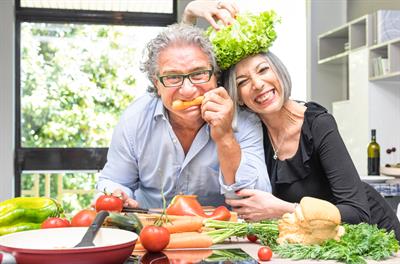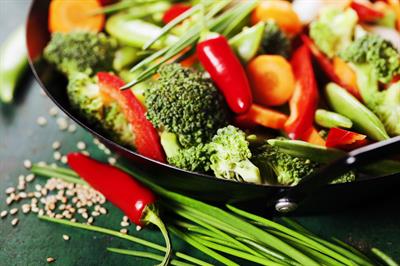Avoiding Animal Products: Can a Vegan Diet Help Prevent Cancer?
July 14, 2017 | Author: BeatCancer.Org
Only five to ten percent of cancer is genetic . That means that the other 90 to 95 percent is solely based on lifestyle, diet, and environmental factors. Unfortunately, what we are eating is largely to blame when it comes to cancer.
The Western Diet, loaded with saturated fats, meat, and dairy, has been found to increase the risk of gastric cancer by 200 percent . As one in every four deaths is from cancer , it is increasingly important to understand how we can tackle this horrendous health condition. With more research studies coming to light about the benefits of a vegan diet and how it can help reverse cancer growth, we should be more aware than ever about which foods are safe
and which foods are putting our health in jeopardy.
Meat
We know that red meat and processed meat are undeniably linked to cancer . However, this does not necessarily mean we should turn to fish and chicken for protein. All animal products have something deadly in common. They all raise IGF-1 levels, a cancer-promoting growth hormone. A study comparing meat-eaters and vegans showed that higher IGF-1 levels were only associated with animal protein intake. In fact, plant protein seemed to decrease IGF-1 levels.12 We rarely hear about growth factors being a health risk because we are all generally more concerned with fat. Animal-based fat causes inflammation in the arteries and can increase hormone production, which raises colon and breast cancer risks .
Dairy and Eggs
In the U.S., cheesy foods like pizza and quesadilla are well-known and well-loved. Unfortunately, these dairy-based, cancer-causing foods aren’t as harmless as we fool ourselves into believing. Dairy products (even organic) contain cancer-promoting casein and other growth factors, are the number one source of saturated fat in America , and can lead to many severe health conditions. A recent study observing over 20,000 physicians showed that those who consumed more than two dairy servings daily had a 34 percent higher risk of developing cancer than those who didn’t consume dairy . As for eggs , the World Health Organization analyzed data from 34 countries and determined that egg consumption was significantly correlated with death from colon and rectal cancers in both men and women.8 Now is a good time to switch that egg and bacon breakfast for oatmeal and fruit!

Foods That Fight Cancer
Many studies prove that following a vegan diet can dramatically decrease your chances of getting cancer. In one well-known study, blood samples were taken from women with breast cancer, who were then asked to try a plant-based diet for two weeks. After the fourteen days, the women’s blood was taken again. The results showed that the vegan blood had nearly eight times the stopping power when it comes to cell cancer growth, as compared with blood taken from people who follow a Standard American Diet.
Fortunately the best cancer fighting foods are affordable and delicious! Vegetables, such as cabbage, broccoli, and kale, contain flavones and indoles that are thought to have anti-cancer properties. Furthermore, vitamin C, found in citrus fruits and many vegetables, blocks the conversion of nitrates to cancer-causing nitrosamines in the stomach . A salad has never sounded so good!
Soy protein, when organic, non GMO, and fermented, is a great protein alternative to meat, containing phytochemicals that help protect against hormone-dependent cancers. In fact, there is growing evidence that eating traditional soy foods may lower the risk of cancers of the breast, prostate, and endometrium.
The Change is on Your Plate
All the evidence points to a low-fat, high-fiber diet that includes a range of fruits, vegetables, whole grains, and beans, as being the best for cancer prevention. Not surprisingly, vegans, whose diets easily meet these requirements, are at the lowest risk for cancer. What’s more, vegans are at a lower risk for cardiovascular disease, autoimmune disease, obesity, stroke, dementia, diabetes, and more!
The good news is that we aren’t helpless at all when it comes to cancer. In fact, the power is in our hands – and on our forks. Contact us at BeatCancer.org to learn more about prevention and how to prevent recurrence.
Sources:
- https://www.cancer.gov/about-cancer/causes-prevention/genetics
- https://www.pcrm.org/health-topics/cancer
- https://www.cdc.gov/cancer/dcpc/data/types.htm
- https://www.who.int/news-room/q-a-detail/cancer-carcinogenicity-of-the-consumption-of-red-meat-and-processed-meat
- https://www.pcrm.org/health-topics/cancer
- https://www.hsph.harvard.edu/nutritionsource/what-should-you-eat/fats-and-cholesterol/types-of-fat/
- https://www.pcrm.org/good-nutrition/nutrition-information/health-concerns-about-dairy
- https://www.pcrm.org/good-nutrition/nutrition-information/health-concerns-with-eggs
- https://www.collective-evolution.com/2016/05/15/study-finds-blood-from-vegans-is-more-protective-against-cancer/
- https://www.pcrm.org/health-topics/cancer
- https://www.cancer.org/healthy/eat-healthy-get-active/acs-guidelines-nutrition-physical-activity-cancer-prevention/common-questions.html
- 12 https://nutritionfacts.org/2013/02/14/animal-protein-and-igf-1/
